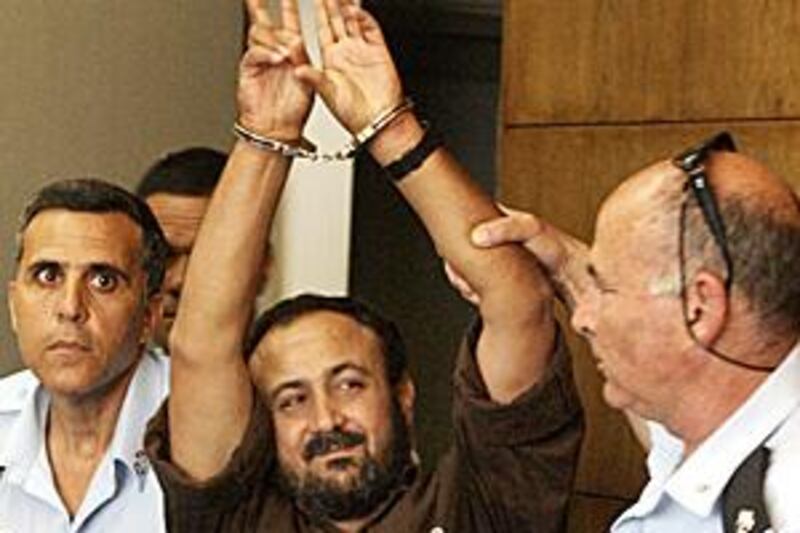TEL AVIV // The Israeli cabinet may approve this week a draft on a long-term ceasefire agreement with Hamas that hinges on the Islamist group releasing an Israeli soldier it has held captive for 2½ years. Israel's cabinet may meet as soon as tomorrow to decide on whether to support the draft, government officials said. The meeting would follow what appears to be a toughening in the stance of Ehud Olmert, Israel's outgoing prime minister, who insisted on Sunday that Israel would not fulfill Hamas's key demand - the opening of the Gaza Strip's border crossings - until the soldier, Sgt Gilad Shalit, is freed in a prisoner swap. "The key now is Gilad Shalit - if that issue is settled, then other things could follow," said Mark Regev, a spokesman for Mr Olmert.
Mr Olmert's position may further cloud prospects for an Egyptian-mediated effort to clinch a truce soon because Hamas is believed to want Israel to open Gaza's crossings before any prisoner swap takes place. It was not clear yesterday whether Hamas would agree to exchange prisoners before embarking on the other terms of the ceasefire. Egypt has struggled to seal an 18-month truce in the Gaza Strip that would replace a shaky ceasefire in place since Jan 18, when Israel ended a 22-day onslaught in the territory that killed about 1,300 Palestinians. The Egyptian-proposed deal calls for the reopening of Gaza's crossings, all of which are controlled by Israel except for Rafah, which is managed by Egypt. The pact also includes Israel's freeing of hundreds of Palestinian prisoners it holds in exchange for Sgt Shalit, as well as reconciliation talks between Hamas and its rival, the Fatah movement, which Hamas violently routed from Gaza in 2007.
Although progress on the agreement has been slow, the two sides appear to aim at reaching a resolution soon amid expectations that a new hardline political leadership will take the Israeli government helm within weeks. Benjamin Netanyahu, viewed by analysts as having the best chance of becoming the next prime minister despite his hawkish party's second-place showing in last week's parliamentary elections, is believed to prefer renewing Israel's military offensive in Gaza in a bid to topple Hamas instead of sealing a ceasefire with the group.
The prisoner exchange deal has also encountered some obstacles, however. According to Al Ahram, Egypt's state-owned newspaper, Israel is still resisting Hamas's demands that it release four Palestinian prisoners convicted of killing Israeli civilians, and is insisting they be exiled to Syria, Lebanon or other countries instead of returning to their homes. They are Ibrahim Hamed, the leader of Hamas's military wing in the West Bank, who was convicted of engineering attacks on Jewish settlements in the Israeli-occupied territory; Abdullah Barghouti, a Hamas member who was sentenced to 67 consecutive life terms for organising suicide bombings in Israel; Abbas al Sayyed, another Hamas member sentenced to 35 life terms for similar charges, and Ahmed Saadat, head of the Popular Front for the Liberation of Palestine, who was sentenced to 30 years in prison by an Israeli military court in December "because of his position and activities within the terrorist movement".
There is also a possibility that Israel could release Marwan Barghouti, a jailed Fatah leader, in a bid to bolster Mahmoud Abbas, the US-backed Palestinian president and head of Fatah. Mr Barghouti was arrested in 2002 in the West Bank during a violent Palestinian uprising against Israel and sentenced to five life terms on charges of orchestrating attacks that killed Israeli civilians and soldiers. Mr Barghouti is considered one of the most popular leaders of Fatah in the West Bank and is often viewed as a possible successor within the faction to Mr Abbas. In 2007, Haaretz called for Mr Barghouti's release, saying he had attempted for years to persuade Israeli leaders to end through negotiation the occupation of territories viewed by Palestinians as part of their future state.
Mr Olmert's new emphasis on achieving the release of Sgt Shalit is part of a bid to rehabilitate his public image after a string of police corruption investigations forced him to resign last year, Israeli commentators said. Israelis both on the right and left of the political spectrum have pushed the government to step up efforts to free Sgt Shalit, whose captivity has been an especially emotional issue in a country where most people have relatives or friends who serve as soldiers in the citizen army. Haaretz, a left-wing newspaper, reported yesterday that Mr Olmert - together with Tzipi Livni, the foreign minister, and Ehud Barak, the defence minister - view Sgt Shalit's release as a "more substantial achievement" than a ceasefire, which could easily be violated by continued rocket fire from Gaza and military action by a new hawkish government headed by Mr Netanyahu.
vbekker@thenational.ae





